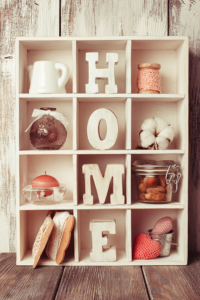A cluttered, untidy home. First World Problem isn’t it?
Well yes, it is a first world problem but it is a problem nonetheless. Not only does clutter and disorder cause huge discontentment but now more people have more stuff they don’t want or need whilst others are in need and have nothing at all. And so, both guilt and resentment surface. Sure, most of us do need possessions and home comforts around us. But more is not always better. “Stuff” in itself just doesn’t make us happy.
But how did we end up accumulating so much? Even just one generation ago, we tended to have far fewer possessions. In the 1950s, the average woman would own three dresses. One for every day, one for best and one spare. They simply weren’t in a position to have more and I bet they didn’t think too much about it. Why have we swung so much in the other direction though? Did we miss the happy medium? And how did it change so quickly?
1. Older members of society often have the ‘waste not, want not’ and “make do and mend” post war mentality ingrained in them. In itself, this isn’t a bad thing. Taking care of our stuff saves money and makes us value and appreciate what we have. But the concept can be taken too far. Some of us hang on to duplicates or possessions which don’t work properly or are no longer to our taste. Ironically, our desire to respect our belongings can mean we end up losing track of what we own and more dangerously, it can affect the look and feel of our home.
2. The rise of Cheap Retail. There’s nothing inherently wrong with cheap goods (as long as they’re ethically produced) But we’ve all wandered around Primark, eyes scanning the shop floor. Then found ourselves reaching for a conveniently positioned large basket to contain all the ‘bargains’ that have ended up tossed over our arm. There can be no denying that we end up with a larger volume of goods because of the low price tag. And the rise of cheap retail MIXED with a waste not, want not mentality….well that’s a very cluttered combination.
3. Sellers want us to be happy with our purchase. But very soon afterwards, they want us to be unhappy! They wouldn’t make any money if we were content in the long term. However great a purchase is, there will always be something better, faster, bigger (or smaller) on the horizon. Some products are really just gimmicks and unlikely to be useful but marketing can be very clever and convincing. Most of us aren’t immune and at some point have been sucked in by hype (including me – here’s my story)
4. A simple explanation for rising levels of possessions might be that these days we take for granted entire classes of possessions that didn’t exist in years gone by. Childrens’ toys tend to be marketed with an end game to ‘collect them all’ Electronics come with various add-ons and wires/cables (isn’t it so common to have draws full of these things?) More things have simply been invented. All this contributes to cluttered homes.
5. People gather stuff to soothe and protect themselves. We rely on it for confidence, authority, escapism, freedom and fun. Our possessions often help with all these things but there’s a limit. If we don’t feel this way internally, our things are just a cover-up. We can’t buy contentment. We have to cultivate it ourselves. From within. Otherwise we’re just trying to fill up a hole that’s so big it will never be filled. In fact the key to fulfilling out needs might be streamlining our stuff – see this theory.
Thank you so much for reading!
A Tidy Mind
So now we know where it comes from, what can we do about it? Take a look at my FAQ and my packages of support.

